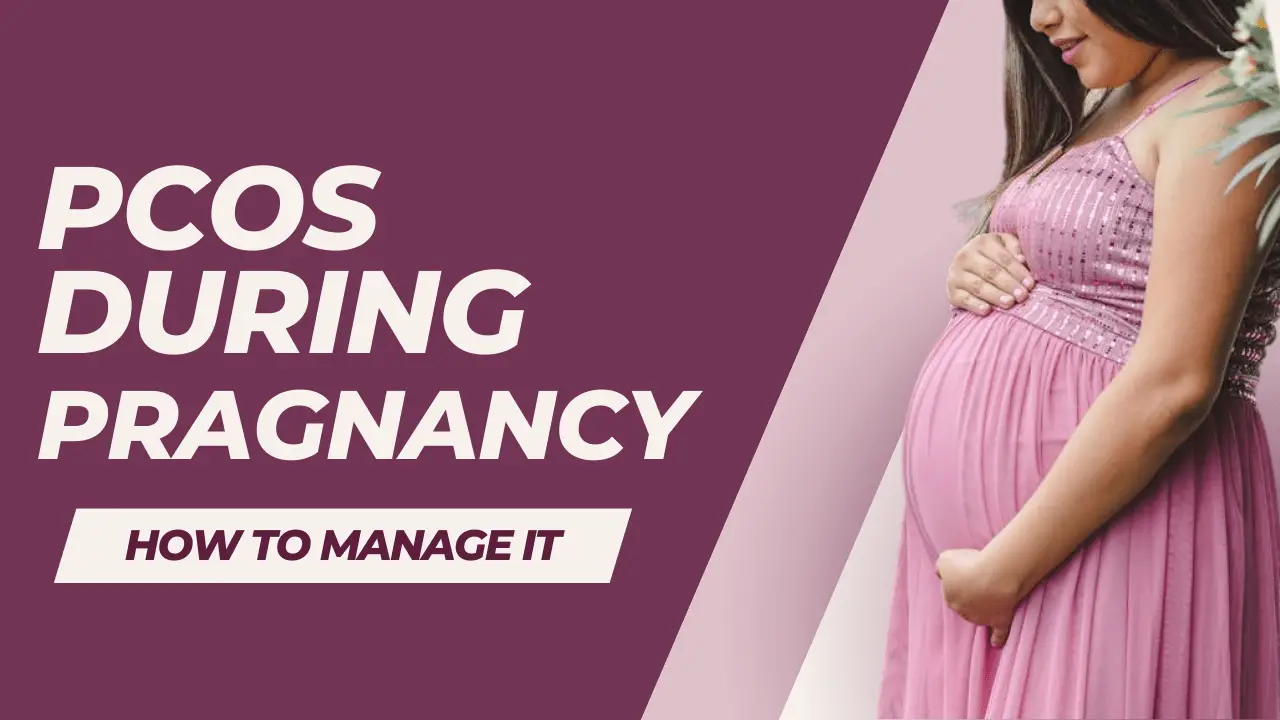PCOS is a hormonal condition that is commonly experienced by women who are fertile. PCOS, which is characterized by polycystic ovaries, excessive hair growth, irregular menstrual periods, and acne, can have a serious negative effect on a woman’s health and ability to conceive.
Many physiological and hormonal changes that occur during pregnancy can affect how PCOS is treated and its symptoms. For expectant mothers with PCOS, it is essential to understand what happens to the condition during pregnancy.
To promote a healthy pregnancy for both mother and child, we will discuss how PCOS symptoms may alter throughout pregnancy, potential issues that may occur, and practical solutions for controlling PCOS.
What Happens to PCOS During Pregnancy:
Hormonal Changes and Their Impact on PCOS

Significant hormonal changes that take place during pregnancy can impact the symptoms of PCOS. Certain PCOS symptoms, like less acne and hair growth, may improve with higher progesterone and estrogen levels.
But these changes in hormones can also worsen other symptoms, such as weight gain and insulin resistance, which calls for close observation and treatment.
How PCOS Symptoms May Change
Recognizing the potential for symptom fluctuation is essential to understanding what occurs with PCOS during pregnancy. Due to the fact that pregnancy naturally stops ovulation and menstruation, some women may notice improvements in symptoms like irregular menstruation cycles.
However, when insulin resistance symptoms grow, such as weariness and weight gain, dietary and lifestyle changes may be necessary to maintain normal blood sugar levels.
Potential Complications and Risks
Certain pregnancy issues, including gestational diabetes, preeclampsia, and premature birth, can be made more likely by PCOS. Regular prenatal care is crucial for women with PCOS in order to monitor for these disorders.
To successfully manage these risks, healthcare experts may suggest more frequent screenings as well as particular interventions.
Women can better prepare for any changes they may encounter and collaborate with their healthcare professionals to promote a good pregnancy journey by being aware of what happens to PCOS during pregnancy.
Managing PCOS During Pregnancy:
Medical Management: Medications and Treatments
Managing PCOS during pregnancy often requires a tailored approach. Some medications commonly used to manage PCOS symptoms, such as metformin, may still be prescribed during pregnancy to help control insulin resistance and reduce the risk of gestational diabetes.
However, other treatments, particularly those involving hormonal regulation, may need to be adjusted or discontinued to ensure the safety of the developing baby. It’s essential for women to consult with their healthcare providers to determine the safest and most effective treatment plan during pregnancy.
Lifestyle Changes: Diet, Exercise, and Stress Management
Maintaining a healthy lifestyle is essential for controlling PCOS throughout pregnancy. A balanced diet high in whole foods, lean proteins, and healthy fats will help control blood sugar levels and help prevent weight gain.
Frequent, mild exercise, like walking or yoga for pregnant women, can also help lower stress and maintain a healthy weight. Because excessive levels of stress can worsen PCOS symptoms and have an adverse effect on the health of the unborn child, stress management strategies like mindfulness and meditation can also be helpful.
Regular Monitoring and Check-ups
Effective therapy for PCOS requires an understanding of what happens to the condition during pregnancy. To keep an eye on the health of both the mother and the fetus, routine prenatal exams are crucial.

These examinations give medical professionals the chance to monitor any changes in PCOS symptoms, make any required adjustments to treatment regimens, and screen for possible side effects like preeclampsia and gestational diabetes.
Regular monitoring helps to achieve a healthy pregnancy result by ensuring that any problems are swiftly addressed. Women with PCOS can manage their pregnancies more skillfully, reducing risks and enhancing the health of mother and child by implementing these management techniques.
Tips for a Healthy Pregnancy with PCOS:
Importance of Prenatal Care
Pregnancy-related PCOS management requires routine prenatal care. Regular and timely visits to a healthcare provider guarantee close monitoring of the mother and child. This makes it possible to identify and treat possible side effects including preeclampsia and gestational diabetes in a timely manner.
Regular check-ups provide an understanding of what happens to PCOS during pregnancy, which aids in modifying care plans as necessary to ensure optimal health.
Nutritional Recommendations
In order to maintain a healthy pregnancy and manage the symptoms of PCOS, a balanced diet is essential. Make a point of consuming a variety of whole foods, such as whole grains, lean meats, fruits, and vegetables.

Reducing sugar and processed food intake can help control insulin resistance and lower the chance of gaining too much weight. It’s crucial for women with PCOS to have stable blood sugar levels, which can be achieved by eating small, frequent meals.
Safe Exercise Routines
Regular physical activity is beneficial for maintaining a healthy weight and reducing stress during pregnancy. Safe exercises for pregnant women with PCOS include walking, swimming, and prenatal yoga.
These activities can help improve insulin sensitivity and enhance overall well-being. It’s important to consult with a healthcare provider before starting any new exercise regimen to ensure it’s appropriate for your specific health condition.
Mental Health and Stress Reduction Strategies
A successful pregnancy requires effective stress management, particularly for women with PCOS. Excessive stress can make PCOS symptoms worse and have a detrimental effect on the success of pregnancies.
Effective stress management can be achieved by incorporating stress-reduction practices including mindfulness meditation, deep breathing exercises, and prenatal yoga. If necessary, getting help from a mental health expert might also be helpful.
Women with PCOS can improve their pregnancy experience by addressing the particular difficulties brought on by their disease and advancing the health of the mother and unborn child by heeding these guidelines.
Real-life Experiences and Tips:
Personal Stories from Women with PCOS
It can be quite helpful to hear firsthand accounts from other women who have managed to conceive with PCOS. These tales frequently emphasize the particular difficulties and victories associated with controlling PCOS during pregnancy.
Women may discuss how their symptoms altered, how they handled difficulties, and the best ways for them to keep their health and well-being. These first-hand accounts offer comfort and a sense of camaraderie by demonstrating that a good pregnancy with PCOS is achievable.
Practical Tips for Managing Symptoms
Women who have experienced pregnancy with PCOS often have practical tips that can be helpful for others. These tips might include dietary adjustments, such as incorporating more fiber and protein to help control blood sugar levels, or specific exercises that were particularly beneficial.
Additionally, advice on managing common symptoms, such as dealing with fatigue or finding skincare routines that address pregnancy-related acne, can be valuable.
Lessons Learned and Advice for Others
Individuals who have experienced PCOS pregnancy can share enlightening insights gained from their experience. This could involve identifying a supportive healthcare team, speaking for oneself in medical settings, and taking an active approach to prenatal care.
Women may also offer guidance on maintaining a good outlook in the face of adversity, striking a balance between work and play, and the significance of mental health treatment. It is helpful to understand what happens to PCOS during pregnancy and how to manage it by drawing on the experiences of others.
Building a Support Network
A lot of women stress how important it is to have a solid support system. Healthcare professionals, relatives, acquaintances, and online groups for women with PCOS can all be a part of this network.
Support networks make the experience of being pregnant easier to handle and less solitary by offering emotional support, helpful guidance, and encouragement.
Women with PCOS can obtain emotional support and practical insights into managing their condition throughout pregnancy by reading about real-life experiences and advice.
This will help them work towards a healthy conclusion for both themselves and their unborn child.
Conclusion:
In conclusion, expecting moms must comprehend what occurs to PCOS during pregnancy. Women can travel this path with more confidence and knowledge if they address hormonal shifts, manage symptoms with medication and lifestyle modifications, and learn from real-life experiences.
Having a supporting network and receiving regular prenatal treatment are essential for ensuring a safe pregnancy even in the face of PCOS difficulties. Through proactive management and individualized care, women can achieve optimal health and well-being both during and after pregnancy. Click to learn more.
FAQs:
- Can pregnancy improve PCOS symptoms?
Yes, pregnancy can lead to hormonal changes that often improve symptoms like acne and irregular menstrual cycles. However, it can also exacerbate symptoms related to insulin resistance.
- What are the risks of pregnancy with PCOS?
Women with PCOS have a higher risk of developing gestational diabetes, preeclampsia, and delivering prematurely compared to women without PCOS.
- Should I continue taking medication for PCOS during pregnancy?
It depends on the medication. Some medications, like metformin, may be safe to continue under medical supervision, while others may need adjustment or cessation to ensure the safety of the baby.
- How can diet help manage PCOS during pregnancy?
A balanced diet rich in whole foods, low in refined sugars, and high in fiber can help manage insulin levels and reduce the risk of gestational diabetes, a common concern for women with PCOS.
- What role does prenatal care play in managing PCOS during pregnancy?
Prenatal care is crucial for monitoring both maternal and fetal health. It allows healthcare providers to detect and manage complications early, ensuring a healthier pregnancy outcome for women with PCOS.
